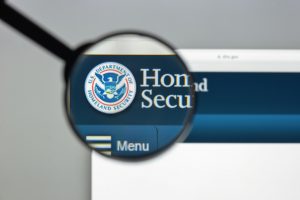 The Department of Homeland Security (DHS) may be the newest cabinet-level department, but it is still facing the same modernization challenges felt across government. The agencies pulled under the DHS umbrella in 2002 came with legacy systems. While a good deal of integration and modernization happened while DHS was being formed, systems have to keep evolving to keep up with the ever-changing threat landscape and the technologies used to threaten the homeland.
The Department of Homeland Security (DHS) may be the newest cabinet-level department, but it is still facing the same modernization challenges felt across government. The agencies pulled under the DHS umbrella in 2002 came with legacy systems. While a good deal of integration and modernization happened while DHS was being formed, systems have to keep evolving to keep up with the ever-changing threat landscape and the technologies used to threaten the homeland.
Cybersecurity, as it relates to the protection of the national infrastructure and government systems, is a huge focus for DHS. In fact, The DHS Secretary recently said that nation-state adversaries "are at the highest levels since the Cold War, largely but not exclusively due to leveraging cyber to conduct espionage and influence operations and disrupt services." As part of their efforts to strengthen their cybersecurity posture, the Department is leading the Continuous Diagnostic Monitoring (CDM) efforts across government to provide capabilities and tools to identify cybersecurity risks on an ongoing basis, prioritize these risks based on potential impacts, and enable cybersecurity personnel to mitigate the most significant problems first.
With a broad mandate to support election security, DHS has been collaborating across the government to ensure the security of machines and records for national elections. New technologies such as Albert sensors, technology designed to detect suspicious IP addresses and malware signatures, will be in place in 90% or more of voting machines used in November.
New technologies such as CDM and sensors may be helping DHS, but other newer tech solutions, including drones and IoT are creating more security challenges. The Department and legislators are working on policy that allows for DHS and other agencies to monitor drones and other devices that pose significant public security risks.
In today's complicated and interconnected world there are no shortage of challenges for DHS. Luckily, there is also no shortage of events that help professionals collaborate and learn.
- Federal IT Security Conference (November 7, 2018; College Park, MD) -- Speakers from NIST, DHS, the Defense Department as well as private industry will discuss the themes and trends that are influencing the Federal/DoD cyber landscape at this third annual event.
- ODNI AIM Industry Day (November 27, 2018; Springfield, VA) -- The Office of the Director of National Intelligence (ODNI) and AFCEA Intelligence will hold this event as a way to hear directly from ODNI leaders and others from across the IC enterprise about the various Augmenting Intelligence using Machines (AIM) initiatives and how the community can take advantage of key transformative technologies at scale. It is designed to help attendees from across the private sector - industry, academia, national laboratories, FFRDCs, research agencies and organizations - better understand where the greatest gaps and needs exist within the IC to support the AIM initiatives.
- Space Resiliency Summit (December 4-5, 2018; Alexandria, VA) This event brings together members of the DoD, Intelligence Community, military services, and critical organizations to discuss solutions and techniques to exploit the space domain. This year's summit will highlight the technology currently underway and the challenges that exist in protecting United States space assets.
- Border Management Summit (December 5-6, 2018; Washington, DC) -- This 3-day summit will focus on creating a forum for military, state, local, federal law enforcement officials as well as industry leaders, to tackle our nation's most difficult challenges of finding workable solutions to border protection challenges that can be implemented in the field immediately.
- Virtual Tabletop Exercise Civil Unrest (December 11, 2018; webcast) - Part of an ongoing virtual event series from DHS this event will provide a virtual forum for disaster training. The process involves key personnel from the emergency management community of practice reviewing a pre-packaged set of exercise materials, then convening for a four-hour tabletop exercise discussion of a simulated disaster scenario with a total of 10-15 individual sites.
- Law Enforcement & Homeland Security Forum and Technology Expo (December 11-13, 2018; Chantilly, VA) - In its tenth year, this event will feature keynote speakers, presentations, panel discussions and case studies on topics germane to Federal Law Enforcement, Homeland Security, Intelligence Community, and the broader national security community. The forum will also include over 40 government and industry technologies, products and programs which will be showcased during the Technology Exposition.
- Cyber Education, Research, and Training Symposium (CERTS) (January 16-17, 2019; Augusta, GA) -- CERTS brings government, education, research, and industry leaders together to focus on advancing cyber workforce development, retention, and support. The event incorporates keynote presentations, panel discussions, open workshops, and extensive networking.
- TechNet Cyber (May 14-16, 2019; Baltimore, MD) - This event is the "staging area" for military, industry and academia to discuss and plan how to achieve persistent engagement, persistent presence and persistent innovation. It is the opportunity to devise a new strategy to build resilience and defend networks.
We'd love to hear from you. What are some can't miss shows for those involved in solving the evolving challenges of homeland security?



